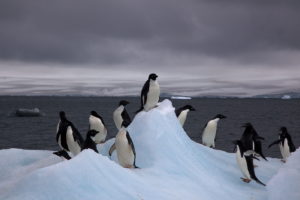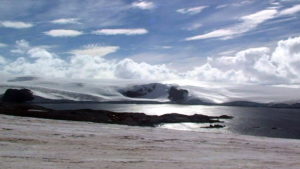On January 30, 1820, Edward Bransfield, a British seaman, landed on the continent of Antarctica, the first known person to do so. He claimed the continent for the British Empire. But that isn’t how the story ends.
In truth, no one knows who was the first person to set foot on Antarctica. Polynesian fishermen and traders had traveled south to the ice fields for centuries. Later, European explorers took up the challenge of going ever farther south in search of whales, fish, hides—and land. They discovered more islands closer to the pole on successive voyages.

Captain Cook himself, the most famous of Pacific explorers, is credited with being the first European to conclude that a continent existed under all that ice. In 1773, aboard the HMS Resolution, Cook crossed over the Antarctic Circle for the first time. However, he never landed on Antarctica itself, driven back from the shore by closing ice.
That honor was left to Edward Bransfield, an Irish seaman stationed with the British fleet in Valparaiso, Chile. Born in 1785 in the County Cork, Bransfield went to sea at 18 and immediately proved himself a worthy sailor and navigator. He rose quickly to become a master, the non-officer with sole responsibility for a ship’s navigation. When news came to Valparaiso in late 1819 that an English merchant ship, the Williams, had been driven far south by strong winds and discovered even more islands (the South Shetland Islands), the fleet commander assigned Bransfield to join the Williams and continue exploring.

Bransfield led his ship to a continuing string of newly discovered islands, claiming each in turn for his government. On January 20, 1820, the ship reached what is now called Trinity Peninsula, the northernmost part of the Antarctic continent. Bransfield and the ship’s captain went ashore, becoming the first known humans to stand on the continent. Antarctica, they claimed, was now the property of the British Empire.
The English claim did not stand without challenge. In the intervening century, seven countries—Argentina, Australia, Chile, France, New Zealand, Norway and the United Kingdom—have made claims to some of Antarctica. In addition, the U.S. and Russia maintain a “basis for claim” that keeps their hands in the pie.
Fortunately, however, Antarctica has not been sliced up into national territories and exploited for military or commercial purposes. And that status was secured forever on December 1, 1959. On that date, twelve countries signed The Antarctic Treaty (Japan, South Africa, and Belgium joined those with territorial claims). The treaty assures that the continent will be used only for peaceful purposes, that scientific study will be free and open, and that all knowledge from those studies will be exchanged and freely available to all. Moreover, the “Protocol on Environmental Protection to the Antarctic Treaty,” added in 1991, designates the Antarctic as a “natural reserve, devoted to peace and science.” It prohibits commercial development of the continent, instead focusing on its extraordinary scientific and biodiversity value (learn more about the treaty here).
References:
Beyond Endurance Expedition. Edward Bransfield. Available at: https://archive.is/20120723161803/http://www.beyondendurance.ie/history/explorer/6. Accessed January 29, 2018.
Cool Antarctica. The UK in Antarctica, The History and Activity of the United Kingdom in Antarctica. Available at: https://www.coolantarctica.com/Antarctica%20fact%20file/activity_of_UK_in_antarctica.php. Accessed January 29, 2018.
Secretariat of the Antarctic Treaty. The Protocol on Environmental Protection to the Antarctic Treaty. Available at: http://www.ats.aq/e/ep.htm. Accessed January 29, 2018.
